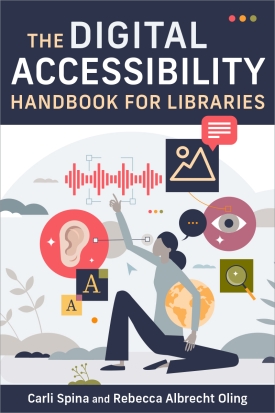
Primary tabs
You don't need to be an ALA Member to purchase from the ALA Store, but you'll be asked to create an online account/profile during checkout to proceed. This Web Account is for both Members and non-Members. Note that your ALA Member discount will be applied at the final step of the checkout process.
If you are Tax-Exempt, please verify that your account is currently set up as exempt before placing your order, as our new fulfillment center will need current documentation. Learn how to verify here.
- Description
- About the authors
Providing concrete guidance on integrating accessibility into all aspects of a library’s digital work, this book will serve as your one-stop guide to accessibility standards, processes, and best practices.
A complicated topic encompassing many disparate facets, digital accessibility in libraries is in constant flux as new technologies emerge and design standards continue to evolve. This makes it challenging for library workers to ensure that their libraries meet legal requirements while also fostering inclusion for all their community members. Incorporating advice from a range of outside accessibility experts and practitioners, this guide is here to help. It delves into practical steps you can take to ensure that your library’s online presence is welcoming to everyone and that all your digital offerings avoid barriers that can exclude users with disabilities. No matter your level of experience or type of library, from this book you will
- come to understand what is meant by disability and why libraries have obligations to support disabled users;
- learn about a wide range of software and hardware for creating inclusive spaces and services regardless of your budget limitations or staffing levels;
- get comfortable with the overarching principles of online accessibility and how they specifically apply to library websites, digital media and files, digital communications, and emerging technologies such as augmented reality, virtual reality, and artificial intelligence (AI);
- discover how libraries can verify the accessibility of the tools they develop or subscribe to, including best practices for working with vendors to optimize the accessibility of their library products;
- be invited to reflect upon the future of digital accessibility, particularly concerning education and hiring to ensure that accessibility remains central to the work done at all libraries.
Both Spina and Oling have worked within SUNY - The State University of New York to hone skills and thinking in this area, resulting in the Library Procurement Accessibility Toolkit, an ongoing project. They currently co-chair a subcommittee reviewing the SUNY libraries' implementation of the Electronic Information Accessibility Policy.
Carli Spina
Carli Spina is an Associate Professor and the Head of Research & Instructional Services at the Fashion Institute of Technology. She regularly publishes, presents, and teaches about Universal Design, accessibility, and user experience in libraries. She is the author of Creating Inclusive Libraries by Applying Universal Design: A Guide (2021).
Rebecca Albrecht Oling
Rebecca Albrecht Oling (MLS, CPACC) is the Director of Digital Accessibility at Purchase College, SUNY. Promoted to Librarian in 2024, Oling has worked to shape approaches to digital accessibility on her campus and beyond. Aside from her research and writing, she consults on accessibility best practices and leads trainings that empower people to create a more universal experience.


